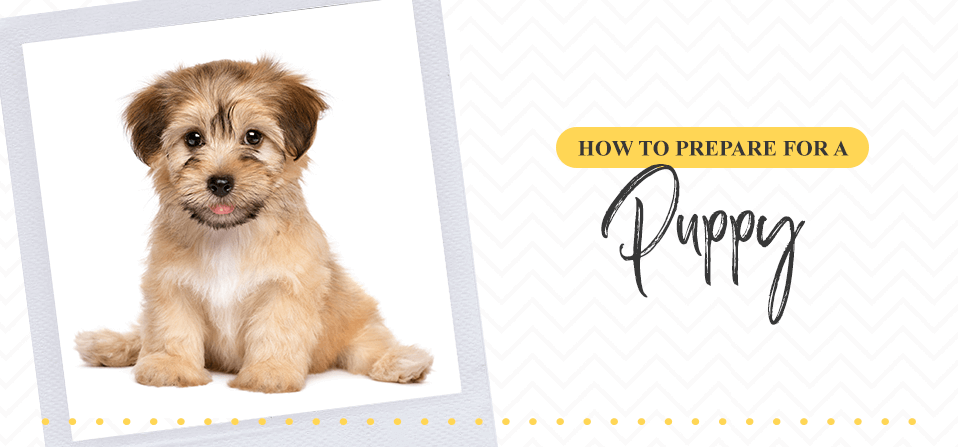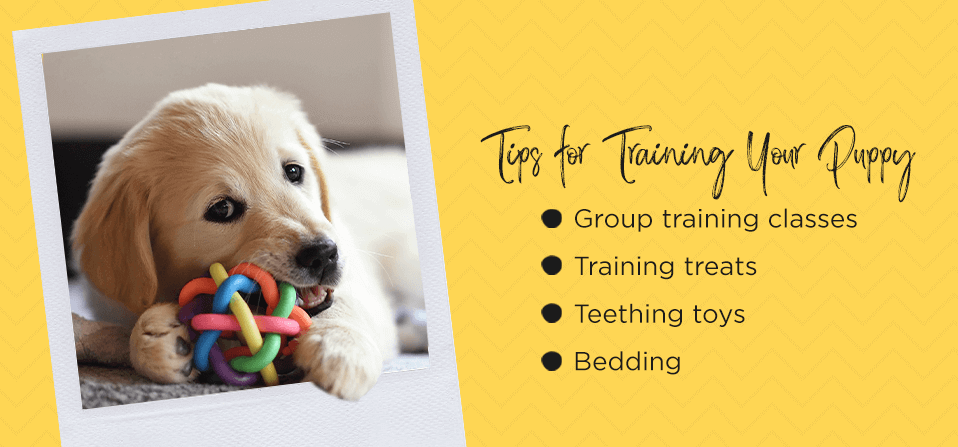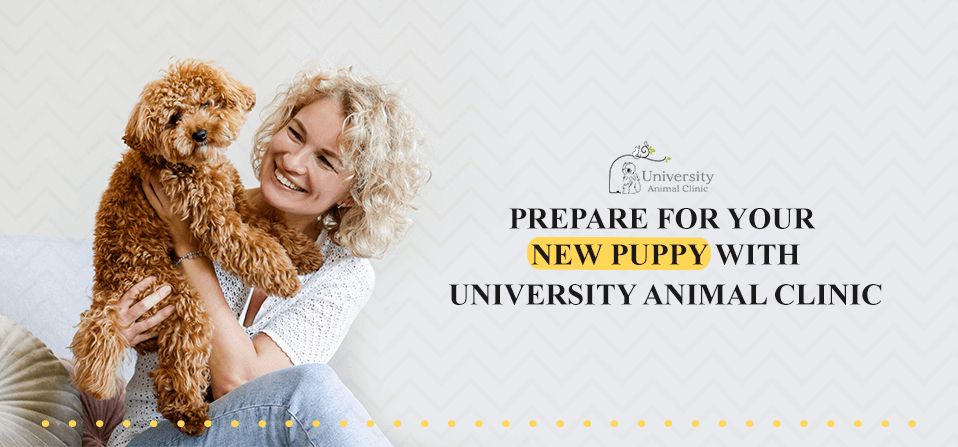
Many of us dream of adding a canine companion to our lives. If you’ve made the decision to become a puppy parent, congratulations! Puppies often grow up to become cherished members of the family. As exciting as it is to bring home a puppy, it’s a serious commitment. To make the process as simple and stress-free as possible, we recommend that you prepare a new puppy checklist ahead of their arrival. Critical things to consider are a new puppy’s material needs, training and medical care.
- What Supplies Do You Need to Prepare for A Puppy?
- Tips for Training Your Puppy
- Your Puppy’s First Vet Visit
- Prepare for Your New Puppy With University Animal Clinic
What Supplies Do You Need To Prepare For A Puppy?
Puppies are living, breathing animals that require much love, care and attention. Bringing a new puppy home can be a big adjustment for you and your household. Before your puppy sets foot in your home, be sure to stock up on these supplies and follow these tips for bringing a puppy home.
-
Food and water: Puppies rely on nourishing, appetizing food in order to grow into strong and healthy dogs. As a puppy’s new owner, you may have your own preferences about your pet’s diet. Initially, it is important not to disrupt the diet that your puppy is already accustomed to. Check with your puppy’s rescue center or breeder about their current diet. You should continue with your puppy’s current diet for at least a week. If you have special dietary concerns, ask your vet for guidance.
-
Two bowls: Make sure you have two separate bowls for your puppy to use — one for food and one for water. The bowls don’t need to be fancy, as long as your puppy can safely and easily access them.
-
A collar with ID tags: Puppies can be so much fun because of their energy and curiosity! Like human children, they also require a close eye. In order to keep your puppy safe, it’s crucial that you provide your puppy with a collar and identification tags. Collars come in a variety of colors, styles and fabrics. You can buy identification tags engraved with your contact information at most pet stores for just a few dollars. Attach them to your dog’s collar.
-
Leash: You will also need to purchase a leash. In many cities, dog owners are required by law to keep their pets on a leash while in public for safety reasons. Walking and exercising your puppy can be a fun bonding experience for new pet owners, and using a leash ensures the safety of your pet and your community.
-
Crate: Because your puppy’s crate will be their safe space, it’s one of the most important items on any new puppy checklist. When selecting a crate, consider how large your puppy will be when they are full-grown. The crate should be large enough for them to stand up and turn around in without touching the top or sides. There are many tips and tricks to get your puppy acclimated to their crate. Be patient and consistent with your puppy and they will be dozing away in their crate in no time.
-
Bedding: While your puppy is still growing and training, you may not want to invest in an actual dog bed yet. Rather, you can easily use common bedding materials to create a cozy “nest” for your puppy inside their crate. We recommend using old bath towels, bed sheets or blankets. Because your puppy is likely teething and may not be house-trained, consider using lightweight bedding materials that are easy to wash and not easy for your puppy to shred.
Tips For Training Your Puppy
-
Group training classes: Establishing a training plan for your puppy can ease their transition into your home. Group training classes can be a great option. With each command that you learn, you and your puppy will bond and build trust with each other. The group class environment will also give your puppy the chance to socialize with other dogs.
-
Training treats: Treats are a great way to reinforce your puppy’s training goals.
-
Teething toys: When it comes to puppies, teething is just a part of life. Make sure your puppy has a teething toy or two that they can use to alleviate discomfort during this stage. Ask a pet store employee for good recommendations. Of course, always consult your vet if you have special concerns about your puppy’s teething.
-
Training pads: Like teething, house-training your pet — and the occasional accidents that come with it — are simply part of the puppy parent experience. Depending on what training method you use to house-train your puppy, you may want to purchase training pads.

Your Puppy’s First Vet Visit
When you are preparing for a new puppy, perhaps the most important step is to establish medical care with a veterinarian in your area. A trusted veterinarian can be your greatest resource when adjusting to puppy parenthood and may provide ongoing care to your pet for many years to come. Veterinarian practices provide many services in addition to general wellness check-ups, such as vaccinations, microchipping, grooming, dental treatments and more.
- Set up the first appointment: Making an appointment with a vet should be the first step on your new puppy checklist. At the first appointment, your vet will be able to assess your puppy’s growth, diet and development.
- Schedule vaccinations: Depending on age, your puppy may be eligible for several life-saving vaccinations. If your puppy has already received any inoculations, their rescue center or breeder should provide you with vaccination records. Most vets recommend a vaccination schedule for puppies that involves a number of different shots between 6-16 weeks of age. Make those vaccination appointments and keep them! Your puppy will thank you.
- Consider microchipping: While it’s always a good idea to have your pet wear ID tags, some owners also decide to employ microchipping. Microchipping is a simple medical procedure in which a veterinary professional inserts a small, radio-frequency implant under your pet’s skin. Many pet owners choose this option for safety and security reasons.
- Consider a wellness plan: Some vets offer wellness plans that help to ensure the most affordable treatment course for you and your pet. Generally, a wellness plan allows you to bundle services together for a discount in price. Wellness plans are kind on your wallet and can serve as an additional motivator to keep up with your pet’s appointments. Click here to pre-enroll in our wellness plans!
Prepare For Your New Puppy With University Animal Clinic
Because there are so many preparations to make for your new puppy, it’s easy to feel overwhelmed. Remember, the most important things any new puppy parent needs are patience, dedication and love. By following the guidance and checklists outlined above, your pup’s transition into your home and family can be as fun and stress-free as possible. As always, we encourage you to reach out to a veterinary or medical professional with any concerns.
University Animal Clinic is proud to provide the compassionate and expert care you can trust. We are here to support you and your pets at every step of your journey together.

